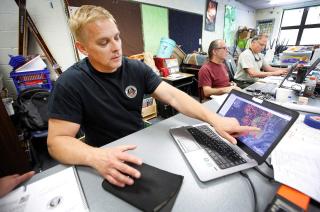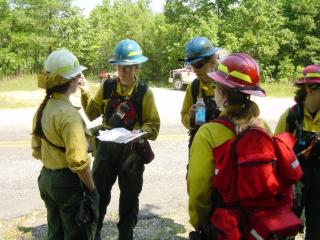Fuels, Fire Analyst and Fire Planner
Anticipating and Solving Fire Problems

Wildland Fire Management:
An incredibly complex endeavor. To be successful, we need cutting-edge thinkers who can help us understand the fire problems of the past, anticipate the fire problems of the future, and help us identify opportunities to act wisely through pre-fire treatments and thoughtful planning that guides our response when wildfires do occur. Before we deploy responders, we need a game plan, and fuels specialists, fire analysts and fire planners are essential to helping determine what actions we should take before, during and after a fire.

Fire Management Planning & Analysis:
The fire management planning and analysis function can be a rewarding career for those individuals who possess analytical skills in formulating long term plans and environmental analyses for projects and unit fire program management activities. Fire planners and analysts use their knowledge of science and ecology along with advanced computer models to predict fire behavior to help weigh options and determine the most appropriate response to wildfires given current and expected weather and fuel conditions. This kind of Big-Picture thinking helps return forests to a healthy state, helps protect highly valued resources and assets, and creates opportunities for firefighters to do their work in a safer, more effective manner. Individuals with degrees in natural resource management, forestry, wildlife biology, and range management often occupy these positions.
Fuels Management:
Managing excess fuels in our national wildlands is one of the biggest challenge’s federal agencies face.
Fuels Management Technicians are the “doers” of fuels management and spend much of their time implementing treatments in the field. Fuels Technicians spend most of the time outdoors, collecting data, cutting and piling trees and brush, and setting prescribed fires to eliminate excess fuels. These positions are usually in the 0462-job series, ranging in Grade from GS-02 to GS-09.
Prescribed Fire/Fuels Specialists typically work in the 0401-job series and range in Grade from GS-05 to GS-11+. These positions require college degrees or GS-0401 qualifying education. These employees are responsible for the development of long-term strategic plans for the treatment of fuels using fire, mechanical, and chemical methods. They work for other resource specialists, stakeholders, and cooperators to identify and prioritize project work across their unit. They often write environment analyses, burn plans, and other technical documents. They may supervise fuels technicians and other firefighters to get fuels treatments done.
What Do Prescribed Fire Specialists Do?
Fire Management Planning & Analysis: The fire management planning and analysis function can be a rewarding career for those individuals who possess analytical skills in formulating long term plans and environmental analyses for projects and unit fire program management activities. Fire planners and analysts use their knowledge of science and ecology along with advanced computer models to predict fire behavior to help weigh options and determine the most appropriate response to wildfires given current and expected weather and fuel conditions. This kind of Big-Picture thinking helps return forests to a healthy state, helps protect highly valued resources and assets, and creates opportunities for firefighters to do their work in a safer, more effective manner. Individuals with degrees in natural resource management, forestry, wildlife biology, and range management often occupy these positions.
Fire Ecologist: Fire ecologists support all aspects of fire and fuels implementation by supporting management with the best available science. This work can vary widely from unit to unit depending on local needs, the state of research in terms of current questions being asked, and other factors. Fire ecologists can help fill the fire management planning and analysis function and can be a rewarding career for those individuals who possess analytical skills in formulating long term plans and environmental analyses for projects and unit fire program management activities. Individuals with degrees in natural resource management, forestry, wildlife biology, and range management often occupy these positions.
Fuels Treatment Success Stories Chart with Videos
| Name | State | Location | Year | Time (min:sec) | Video Name and Link |
|---|---|---|---|---|---|
| Rosland Road Fire | Oregon | Deschutes N.F. | 2020 | 03:53 | A Restoration Success Story |
| Timber Crater 6 Fire | Oregon | Crater Lake N.P. and the Fremont-Winema N.F. | 2018 | 04:11 | A Fuels Treatment Success Story |
| McCloud Fire | Washington | Okanogan-Wenatchee N.F. | 2018 | 04:30 | Fighting Fire with Fire in Central Washington |
| Milli Fire | Oregon | Deschutes N.F. | 2017 | 04:16 | Fuels Reduction Program - Before the Fire |
| Brian Head Fire | Utah | Dixie N.F. | 2017 | 04:39 | Fuels Treatment Aid in the Management of the Brian Head Fire |
| San Juan Fire | Arizona | Apache-Sitgreaves N.F. | 2014 | 11:42 | Fuels Treatment and Fire Management |
| Slide Fire | Arizona | Coconino N.F. | 2014 | 11:26 | Every Fire is an Opportunity to Treat a Landscape |
| Carpenter 1 Fire | Nevada | Humboldt-Toiyabe N.F. | 2013 | 05:12 | Hazardous Fuels Reduction Projects |
| New Harmony Hazardous Fuels Reduction | Utah | Dixie N.F., Bureau of Land Management, Utah Forestry, Fire, and State Lands | 2012 | 07:16 | New Harmony Utah Multi Agency Fuels Projects Saves Homes from Wildfires |
| Pole Creek Fire | Oregon | Deschutes N.F. | 2012 | 04:44 | Make Wildland Urban Interface Communities Safer with Fuels Reduction |
